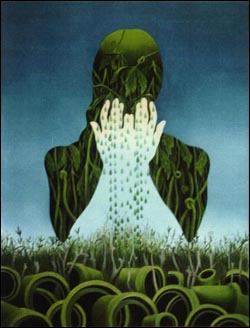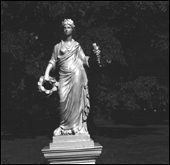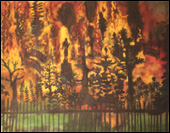
Lamentation, 1976–77, oil
Politics
I
She had little interest in politics, at least until the Eighties when we bought a TV set and she became involved in the fight to prevent a condo high-rise being put up kitty-corner from the Halifax Public Gardens.
I suspect she felt that all politicians were more or less out for themselves, that the world was not one in which any system was going to bring a millenium, and that becoming knowledgeable about politics required far more energy than she was prepared to put out. She was amused by how her friend Nancy O’Brien, who was a convinced member of the New Democratic Party, lived and breathed politics —knew all the players and scores, and so forth.
When we first met, I had recently, from 1951-53, lived and worked in Israel, and was not only pro-Zionist but what I suppose might be called a judophile. Most of my friends over the years had been Jewish, and Germany was for me a place of demons. C., who had lived in Göttingen for a year in 1951-52, was a good deal less simplistic. There were Germans and Germans, and she had met some very good ones and heard about the tradition of Protestant resistance to Nazism. There is a drawing of Konrad Adenauer among her early pieces.
She liked Hubert Humphrey a lot, and we went to hear him speak at a political rally in Minneapolis. We also went to hear Kennedy speak, and watched the Nixon-Kennedy debates on TV in the apartment of Bill Bartsch and John Blue, and felt that Kennedy had won. But she was never a particular fan of Kennedy’s.
She felt no uneasiness about being in Communist Yugoslavia in 1957, or about the thought of going to hear Sidney Bechet play in Paris that year at an event sponsored by the French Communist party. It was I who felt that it would be imprudent of us to go, not yet having the U.S. citizenship that I yearned for.
Shortly after we arrived in Halifax, we were invited to an evening at the Doulls—James and Nancy, the latter of whom became Nancy O’Brien after their divorce. It was a strongly NDP evening. James, a cerebral and learned professor of Classics at Dalhousie, talked about the time when it would be possible for farmers to work their land in the day and at night read Homer in the original Greek. C. remarked to me afterwards that this showed a remarkable naiveté about farmers and farming.
II
She got annoyed when she heard about people preferring to live off government handouts rather than work. She insisted —mostly in the Seventies, I think—that work was there if people were willing to do it. She also got annoyed by reports of prisoners demanding colour TV, heated swimming pools, and the like.
I don’t recall that she ever came down explicitly on one side or the other with respect to abortion.
She was annoyed by loose talk about abortion being simply like having your tonsils out, and by thoughtless teenagers who were using abortion as a substitute for the birth control that they were too self-indulgent to practice. But she had friends who had had abortions, and it is possible that had she become pregnant during our graduate student years, when we working at high pressure, we too might have tried to get an abortion. If she had been pushed to the wall, I imagine that she would have been pro-choice, but with the feeling that having an abortion was a very serious step and should be viewed as such. Her women friends probably know more about this aspect of her than I do.
She disliked man-hating feminists. She herself liked men, and said at various times that her own professional life had been easier before the feminists really got going. She was bored by feminist artists talking about themselves and the Problems of Women on video. She also felt that women could be just as exploitative of women as men. She had in mind one or two gallery directors there.
III
She felt that artists were artists were artists, and resented being labelled a woman artist. But she was a generous reviewer of the work of younger women artists, valued the friendship and art of older women artists like Aileen Meaghar and Ruth Wainwright, and was responsible for the very modest Grace Keddy being given a solo show in the Dalhousie art gallery. She wrote an introduction to the little catalogue, and I’m sure had something to do with the purchase of one of the paintings by the gallery, or by the provincial art gallery, I forget which.
IV
She was sardonic about one of the city’s revered do-gooders, an anti-nuclear activist who seemed to spend a fair amount of time at conferences and on free trips to Nicaragua and the like. C. said she’d feel more respect for her if she thought that she ever actually went out and did good in an unglamorous way to individual people, by which she probably meant working part-time in hospitals, or soup-kitchens, or the like. How fair she was in this I don’t know.
When a hardcore but agreeable Marxist-Leninist couple at Dalhousie showed us in the early Seventies a film that they had made of their recent trip to China, she was not as overwhelmed as they hoped by their tales about a new Eden. She asked whether there were any prisons. I seem to recall that there weren’t, or that if there were they somehow didn’t matter. Neighbours cared about neighbours and persuaded them collectively to mend their ways. At that time I was still myself somewhat off to the Left, after our Mexican experience and the accounts that we heard there about doings in other Latin American countries.
She liked Jimmy Carter and loathed, simply loathed, Ronald Reagan. Her one real American political hero, though I don’t know how much she knew about him, was Lincoln.
V
She watched a lot of TV after we acquired our Sony Positronic, including programmes like the McNeill-Lehrer Hour and Nightline. After awhile her opinions started to coincide with those expressed in such programmes, and in Good Morning, America, which she watched every morning before I was up. She didn’t do any focussed reading about political matters, and I think a mild form of brainwashing occurred. I myself was reading regularly the NY Review of Books, Commentary, the Village Voice, and the New Criterion, as well as Time and Newsweek, and from time to time would suggest that issues like disarmament and the war on drugs were less clearcut than they might seem. I exasperated her. Our discussions were unprofitable.
However, she often watched the McLaughlin Group on Sundays with me, though she disliked Pat Buchanan and wished that they wouldn’t all shout at one another so much. She preferred Inside Washington later the same night. For some time in the Eighties I watched the William F. Buckley show pretty regularly, and she would sometimes watch that too. She thought him a dreadful poseur.
She liked Michael Dukakis a lot and very much wanted him to win against George Bush. I think that her political preferences were a good deal determined by the nature of the personalities involved. She wanted people to be decent, sincere. and not patently hungry for personal power.
VI
She detested City Hall and City Council manoeuvrings. To her it was clear beyond any argument that it would be monstrous for a consortium of doctors and dentists to be allowed to knock down a row of Victorian houses, including the beautiful and historically significant Hart House, and put up a high-rise—originally two high-rises—kitty-corner from the Halifax Public Gardens. She joined the small group called the Friends of the Public Gardens, and did a great deal of work as a member of it.
She took her turn at the table at the main entrance to the Gardens collecting signatures for a petition against the project; made displays for that and other occasions; grew plants to be sold to raise money; went to public hearings and meetings of City Council; organized—or helped organize—a fund-raising art exhibition; worked long hours, in conjunction with Betty Moore and Lesley Armstrong, to put out an illustrated history of the gardens by various hands. There were some prima donnas involved. C. was never a prima donna.
There was a strong Irish element in City politics and on city council. C. frequently said vehemently that she hated the Irish, despite the fact that Aileen Meagher had been one of her best friends (her death really shook C.) and that she was fond of our next-door neighbour Dennis Ryan. I think that when she said the word “Irish,” she had in mind the brutal, bare-knuckle figure of one of the aldermen, and her general feeling that when you were dealing with such figures it was pointless to talk to them about principles, because for them politics was about power and deals and money, not about principles.
The bad guys won that fight, as might have been expected. The Victorian houses came down overnight, the highrise went up, and it was as ugly and inappropriate as opponents had said it would be. But up to the end it had seemed that there was a fighting chance that things could go the right way. The campaign was an impressive one.
VII
She disliked the idea of group entitlements.
I do not believe that she herself ever felt that she was entitled to anything as a right. Everything that she achieved had to be earned, and she had to go on proving herself up to the end. I am sure that when she was struggling with her paintings in Ajijic after several years away from oils, it was without any sense of an art community waiting with sympathetic interest to see what Carol Fraser would do next and prepared to be interested in what she did because it was she who did it.
She belonged to a minority group herself. How many distinguished Swedish or Swedish-American artists can you think of.
VIII
During the Eighties she was implacably against the legalization of drugs. She smoked pot herself on one or two social occasions in the early Seventies, and was not bothered by the fact that artists whom she liked smoked it, but she was beyond reasoning with about legalization. I think she felt that legalization would be the same as legitimation, which is to say an endorsement of the slovenly and irresponsible Sixties attitudes, as she saw it. She despised the laid-back performance by Kate and Anna McGarrigle and their group that we attended at Acadia University. Personally I loved them.
She was, of course, concerned about the harms done by hard drugs, but I’m sure it went deeper than that. This was one place where we were totally out of agreement. I thought that far more harm was being caused by the so-called war on drugs than could ever be caused by drugs themselves, harmful though some of them obviously were.
Towards the end she was tired, probably bone-tired, and had taken such hard knocks, and seen so many of her own best hopes disappointed, that I think she simply gave up the on-the-one-hand, on-the-other-hand effort to see political issues from different perspectives.

[Lost Garden], (central panel of triptych), 1989, oil





